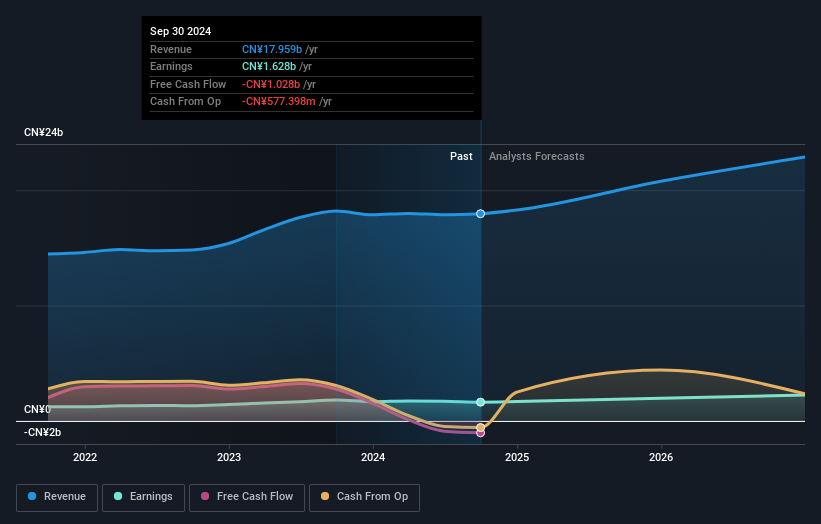Private companies among Beijing Tongrentang Co., Ltd's (SHSE:600085) largest stockholders and were hit after last week's 4.2% price drop

Key Insights
- Beijing Tongrentang's significant private companies ownership suggests that the key decisions are influenced by shareholders from the larger public
- 52% of the company is held by a single shareholder (China Beijing Tong Ren Tang Group Co. Ltd.)
- Institutional ownership in Beijing Tongrentang is 16%
If you want to know who really controls Beijing Tongrentang Co., Ltd (SHSE:600085), then you'll have to look at the makeup of its share registry. And the group that holds the biggest piece of the pie are private companies with 52% ownership. That is, the group stands to benefit the most if the stock rises (or lose the most if there is a downturn).
As a result, private companies as a group endured the highest losses last week after market cap fell by CN¥2.4b.
Let's take a closer look to see what the different types of shareholders can tell us about Beijing Tongrentang.
See our latest analysis for Beijing Tongrentang

What Does The Institutional Ownership Tell Us About Beijing Tongrentang?
Many institutions measure their performance against an index that approximates the local market. So they usually pay more attention to companies that are included in major indices.
Beijing Tongrentang already has institutions on the share registry. Indeed, they own a respectable stake in the company. This suggests some credibility amongst professional investors. But we can't rely on that fact alone since institutions make bad investments sometimes, just like everyone does. If multiple institutions change their view on a stock at the same time, you could see the share price drop fast. It's therefore worth looking at Beijing Tongrentang's earnings history below. Of course, the future is what really matters.

Beijing Tongrentang is not owned by hedge funds. Our data shows that China Beijing Tong Ren Tang Group Co. Ltd. is the largest shareholder with 52% of shares outstanding. With such a huge stake in the ownership, we infer that they have significant control of the future of the company. In comparison, the second and third largest shareholders hold about 3.5% and 3.0% of the stock.
Researching institutional ownership is a good way to gauge and filter a stock's expected performance. The same can be achieved by studying analyst sentiments. There are a reasonable number of analysts covering the stock, so it might be useful to find out their aggregate view on the future.
Insider Ownership Of Beijing Tongrentang
While the precise definition of an insider can be subjective, almost everyone considers board members to be insiders. Company management run the business, but the CEO will answer to the board, even if he or she is a member of it.
Most consider insider ownership a positive because it can indicate the board is well aligned with other shareholders. However, on some occasions too much power is concentrated within this group.
Our data cannot confirm that board members are holding shares personally. It is unusual not to have at least some personal holdings by board members, so our data might be flawed. A good next step would be to check how much the CEO is paid.
General Public Ownership
The general public, who are usually individual investors, hold a 31% stake in Beijing Tongrentang. While this size of ownership may not be enough to sway a policy decision in their favour, they can still make a collective impact on company policies.
Private Company Ownership
Our data indicates that Private Companies hold 52%, of the company's shares. It's hard to draw any conclusions from this fact alone, so its worth looking into who owns those private companies. Sometimes insiders or other related parties have an interest in shares in a public company through a separate private company.
Next Steps:
While it is well worth considering the different groups that own a company, there are other factors that are even more important. For example, we've discovered 2 warning signs for Beijing Tongrentang (1 is concerning!) that you should be aware of before investing here.
If you would prefer discover what analysts are predicting in terms of future growth, do not miss this free report on analyst forecasts.
NB: Figures in this article are calculated using data from the last twelve months, which refer to the 12-month period ending on the last date of the month the financial statement is dated. This may not be consistent with full year annual report figures.
Valuation is complex, but we're here to simplify it.
Discover if Beijing Tongrentang might be undervalued or overvalued with our detailed analysis, featuring fair value estimates, potential risks, dividends, insider trades, and its financial condition.
Access Free AnalysisHave feedback on this article? Concerned about the content? Get in touch with us directly. Alternatively, email editorial-team (at) simplywallst.com.
This article by Simply Wall St is general in nature. We provide commentary based on historical data and analyst forecasts only using an unbiased methodology and our articles are not intended to be financial advice. It does not constitute a recommendation to buy or sell any stock, and does not take account of your objectives, or your financial situation. We aim to bring you long-term focused analysis driven by fundamental data. Note that our analysis may not factor in the latest price-sensitive company announcements or qualitative material. Simply Wall St has no position in any stocks mentioned.
About SHSE:600085
Beijing Tongrentang
Engages in the scientific research, production, distribution, and sale of Chinese medicines in China.
Excellent balance sheet average dividend payer.
Market Insights
Community Narratives




